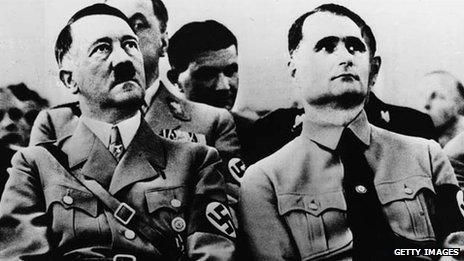Rudolf Hess: Inside the mind of Hitler's deputy
- Published

Hess had been in prison with Hitler in the 1920s
Previously unseen notes of an army psychiatrist reveal how the British tried to get inside the mind of Germany's Deputy Fuhrer, Rudolf Hess, during World War II in an attempt to get inside the mind of the Nazis.
On a rainy summer afternoon, on 2 June 1941, Dr Henry Dicks arrived at the heavily fortified MI6 safe house in Surrey, having been called to examine Hess, who was a British prisoner.
He was led up to the first floor and into a guarded room for a one-on-one meeting with the man who had been second in line - after Hermann Goering - to succeed <link> <caption>Adolf Hitler</caption> <url href="http://www.bbc.co.uk/history/people/adolf_hitler" platform="highweb"/> </link> .
By trying to understand Rudolf Hess and his loyalty to Hitler, Dicks hoped to glean useful insights into what was seen as the collective madness of the Nazi leadership.
In the media, Hess had appeared square-jawed and strong, often pictured striding side-by-side with Hitler. In the flesh, that illusion was soon shattered.
"The first impression is undoubtedly of a schizoid psychopath," Dicks wrote in the notebook, which has only recently been made public by his family.
"Compared to the photos in the press, the face is that of some tormented beast. The face is bestial, ape or wolf, that was at one time or might have been quite charming as a youth."
As their talks progressed, Dicks was struck by Hess and Hitler's admiration of the English, despite Germany having the upper hand in the war at that time.
"I believe they are trying to frighten us but are themselves frightened of us," he wrote.
"They have always envied us and aped us in their life forms, dress, correctness etc... They are at least, in part, ambivalently in love with us. We are that elusively superior race they so frantically want to be themselves."
Dicks thought an affection for the British may have been why Hess chose to make his solo flight to Scotland on 10 May 1941, in what he said was a peace mission.
Hitler said he had no knowledge of what Hess was trying to do and the Nazi Party soon declared him insane.
Some historians, though, believe that Hess was seeking to implement the Fuhrer's wish to make a deal with the British so the Germans - who were about to invade Russia - wouldn't have to fight on two fronts.
The opportunity to examine Hess gave Britain a chance to try to make sense of the forces driving the Nazis. To understand the "root of this insanity", says historian Prof Richard Overy of Exeter University.
"I think it became important for people to try and guess what Hitler would say if he was on the couch, so then you could try to understand a bit more about how he would behave."
Following his arrival in Scotland, Hess was furious he'd been kept as a prisoner instead of being treated as a peace envoy. He had demanded to meet a senior British official and eventually the government decided to play along, sending the Lord Chancellor John Simon on 10 June 1941.
Dicks recorded Hess's intense anxiety prior to the meeting and attributed it to his unconscious feelings of inferiority around the British. After Lord Simon had rejected Hess's proposals, Dicks worried his patient would spiral out of control. His fears proved correct.
Days later Hess threw himself over the banister of the staircase in the building where he was being held. He demanded to see Dicks in the early hours of the morning then rushed towards him, jumping over the banisters and breaking his leg, according to the psychiatrist.
Hess survived, and his erratic behaviour continued to fascinate his British captors. A dog-like devotion to Hitler is why Hess is thought to have been given such a senior position in the Nazi party.
Dicks and his fellow psychiatrists wanted to form a strategy to de-Nazify the German population. Re-education was one idea that Dicks touched on in his final note before handing Hess's case over to a colleague on 15 July 1941.
"From his statements to various officers recorded in reports by (intelligence officer) Major Foley, it seems clear that his unconscious admiration of England is now coming more to the surface," he wrote.
"This should be attributed to the wise decision to permit him access to English news and certain periodicals as a basis for educative talks with Major Foley and other officers. This education has had a great deal to do with the disappearance of his delusions."
Dr Jessica Reinisch, from the University of London, says Dicks's belief that he could reason with Hess to try to liberate him from his Hitler obsession was an optimistic view for that time.
The commonly held view among scholars was that there was little hope for the future, because the German mind was unalterably authoritarian, paranoid and militarist.
"Dicks uses his experience with Hess, as well as German prisoners of war in Britain, to say that what he's learnt in these episodes can be directly applied to the problem of de-Nazifying Germans and also selecting suitable candidates for important jobs in the new German administration," says Reinisch.
British doctors wanted to understand the bigger picture of how to address fanatical Nazis' unconscious adoration of authority, says Prof Daniel Pick, of Birkbeck College, University of London, whose research into the subject was the catalyst for finding Dr Dicks's previously unseen notes.
"I think they use Hess with the idea that Hess is an extreme, fanatical Nazi type who's drawn to Hitler for reasons also to do with very personal unconscious factors, including the search for an authority figure who will substitute for an authoritarian father figure.

Hess flew solo to Scotland in an apparently unauthorised peace mission
"At the same time that Hess was being studied the American secret services commissioned a psychoanalyst to study Hitler's mind," adds Pick.
In 1942, and still a British prisoner, Hess was moved to Maindiff Court military hospital in Abergavenny, where he stayed until the end of the war.
Then during an often bizarre performance at the Nuremberg trials, Hess was sentenced to life in prison. Many at the time thought him mentally unfit to be on trial and the British Prime Minister Winston Churchill later acknowledged that he considered Hess to have been a medical case rather than a criminal case.
Dicks later said that no one who met Hess could believe he could have held such high power.
"He was pathetic and pitiful rather than menacing or unpleasant," Dicks later said in an interview. "We who surrounded him always felt that this was a very insecure man who had been greatly damaged somehow in his earlier life and if only better means had existed, if only he hadn't had been such an important prisoner of state, we might have done more for him."
Hess died in Spandau Prison in 1987, aged 93. The official cause of death given was suicide, but - as is typical about most things involving Hess - other theories abound, including that the Allies had him murdered.